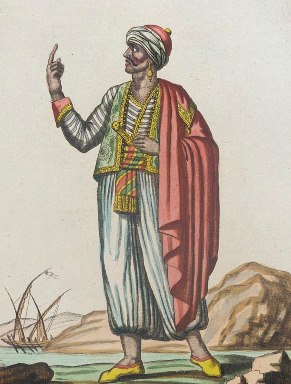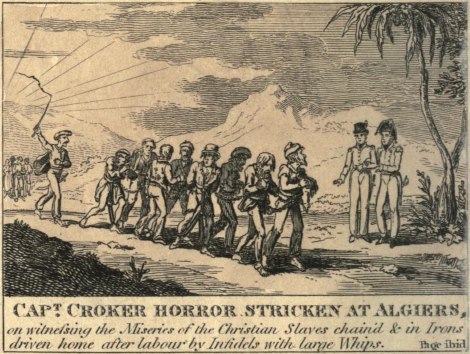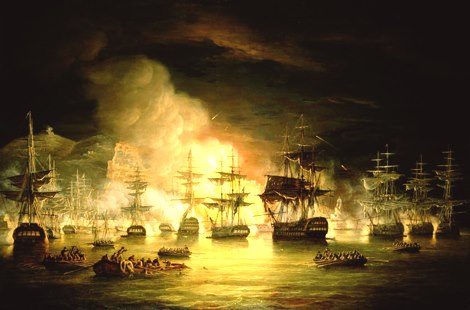For over 300 years, the coastlines of the south west of England were at the mercy of Barbary pirates (corsairs) from the coast of North Africa, based mainly in the ports of Algiers, Tunis and Tripoli. Their number included not only North Africans but also English and Dutch privateers. Their aim was to capture slaves for the Arab slave markets in North Africa.
The Barbary pirates attacked and plundered not only those countries bordering the Mediterranean but as far north as the English Channel, Ireland, Scotland and Iceland, with the western coast of England almost being raided at will.

Partly as a result of an inadequate naval deterrent, by the early 17th century the situation was so bad that an entry in the Calendar of State Papers in May 1625 stated, ‘The Turks are upon our coasts. They take ships only to take the men to make slaves of them.’
Barbary pirates raided on land as well as at sea. In August 1625 corsairs raided Mount’s Bay, Cornwall, capturing 60 men, women and children and taking them into slavery. In 1626 St Keverne was repeatedly attacked, and boats out of Looe, Penzance, Mousehole and other Cornish ports were boarded, their crews taken captive and the empty ships left to drift. It was feared that there were around 60 Barbary men-of-war prowling the Devon and Cornish coasts and attacks were now occurring almost daily.
Sir John Eliot, Vice Admiral of Devon, declared that the seas around England “seem’d theirs.”
The situation was so bad that in December 1640 a Committee for Algiers was set up by Parliament to oversee the ransoming of captives. At that time it was reported that there were some 3,000 to 5,000 English people in captivity in Algiers. Charities were also set up to help ransom the captives and local fishing communities clubbed together to raise money to liberate their own.
In 1645, another raid by Barbary pirates on the Cornish coast saw 240 men, women and children kidnapped. The following year Parliament sent Edmund Cason to Algiers to negotiate the ransom and release of English captives. He paid on average £30 per man (women were more expensive to ransom) and managed to free some 250 people before he ran out of money. Cason spent the last 8 years of his life trying to arrange the release of a further 400.
By the 1650s the attacks were so frequent that they threatened England’s fishing industry with fishermen reluctant to put to sea, leaving their families unprotected ashore.
Oliver Cromwell decided to take action and decreed that any captured corsairs should be taken to Bristol and slowly drowned. Lundy Island, where pirates from the Republic of Salé had made their base, was attacked and bombarded, but despite this, the corsairs continued to mount raids on the coastal towns and villages in Cornwall, Devon and Dorset.
Those kidnapped would be sent to the slave markets of the Ottoman Empire to be bought as labourers or concubines, or pressed into the galleys where they would man the oars. The Spanish novelist Miguel de Cervantes, author of ‘Don Quixote’, was a captive in Algiers between 1575 and 1580, when he was ransomed by his parents and the Trinitarians, a Catholic religious order.

The Barbary slave trade even features in Samuel Pepys’ diary, in an entry from 8th February 1661:
‘…went to the Fleece Tavern to drink; and there we spent till four o’clock, telling stories of Algiers, and the manner of the life of slaves there! And truly Captn. Mootham and Mr. Dawes (who have been both slaves there) did make me fully acquainted with their condition there: as, how they eat nothing but bread and water. … How they are beat upon the soles of their feet and bellies at the liberty of their padron. How they are all, at night, called into their master’s Bagnard; and there they lie. How the poorest men do use their slaves best. How some rogues do live well, if they do invent to bring their masters in so much a week by their industry or theft; and then they are put to no other work at all. And theft there is counted no great crime at all…’
Something had to be done. In 1675 Sir John Narborough, backed by a Royal Navy squadron, managed to negotiate a peace with Tunis. A heavy naval bombardment by the British then brought about a similar peace with Tripoli.

Algiers was also attacked from the sea, not only by British warships but also by the French and Spanish. The United States fought two wars against the Barbary States of North Africa: the First Barbary War of 1801–1805 and the Second Barbary War, 1815 – 1816. Finally after an attack by the British and Dutch in 1816 more than 4,000 Christian slaves were liberated and the power of the Barbary pirates was broken.
from Hacker News https://ift.tt/NlLRwyn
No comments:
Post a Comment
Note: Only a member of this blog may post a comment.